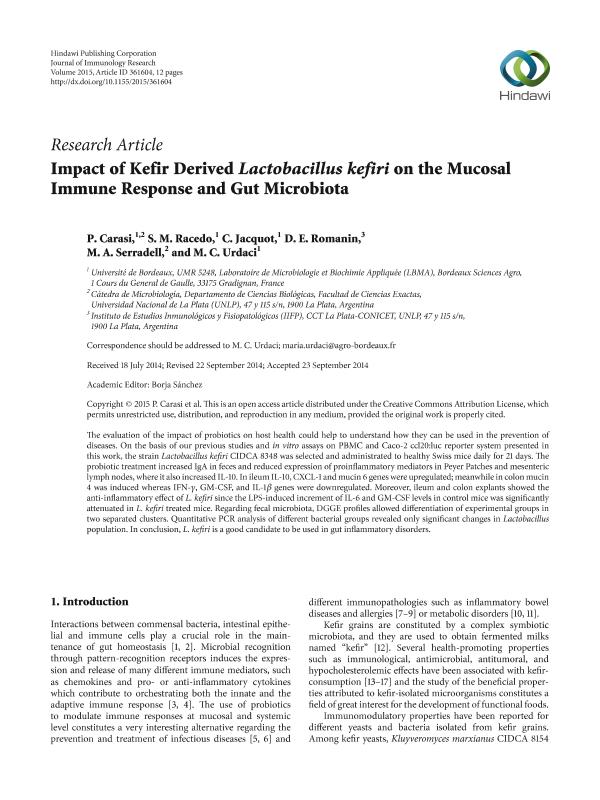Artículo
Impact of kefir derived lactobacillus kefiri on the mucosal immune response and gut microbiota
Carasi, Paula ; Racedo, Silvia María
; Racedo, Silvia María ; Jacquot, C.; Romanin, David Emmanuel
; Jacquot, C.; Romanin, David Emmanuel ; Serradell, María de los Ángeles
; Serradell, María de los Ángeles ; Urdaci, M. C.
; Urdaci, M. C.
 ; Racedo, Silvia María
; Racedo, Silvia María ; Jacquot, C.; Romanin, David Emmanuel
; Jacquot, C.; Romanin, David Emmanuel ; Serradell, María de los Ángeles
; Serradell, María de los Ángeles ; Urdaci, M. C.
; Urdaci, M. C.
Fecha de publicación:
02/2015
Editorial:
Hindawi Publishing Corporation
Revista:
Journal of Immunology Research
ISSN:
2314-8861
e-ISSN:
2314-7156
Idioma:
Inglés
Tipo de recurso:
Artículo publicado
Clasificación temática:
Resumen
The evaluation of the impact of probiotics on host health could help to understand how they can be used in the prevention of diseases. On the basis of our previous studies and in vitro assays on PBMC and Caco-2 ccl20:luc reporter system presented in this work, the strain Lactobacillus kefiri CIDCA 8348 was selected and administrated to healthy Swiss mice daily for 21 days. The probiotic treatment increased IgA in feces and reduced expression of proinflammatory mediators in Peyer Patches and mesenteric lymph nodes, where it also increased IL-10. In ileum IL-10, CXCL-1 and mucin 6 genes were upregulated; meanwhile in colon mucin 4 was induced whereas IFN-γ, GM-CSF, and IL-1β genes were downregulated. Moreover, ileum and colon explants showed the anti-inflammatory effect of L. kefiri since the LPS-induced increment of IL-6 and GM-CSF levels in control mice was significantly attenuated in L. kefiri treated mice. Regarding fecal microbiota, DGGE profiles allowed differentiation of experimental groups in two separated clusters. Quantitative PCR analysis of different bacterial groups revealed only significant changes in Lactobacillus population. In conclusion, L. kefiri is a good candidate to be used in gut inflammatory disorders.
Palabras clave:
Lactobacillus Kefir
,
Immunomodulation
,
Mucins
,
Intestinal Microbiota
Archivos asociados
Licencia
Identificadores
Colecciones
Articulos(CCT - LA PLATA)
Articulos de CTRO.CIENTIFICO TECNOL.CONICET - LA PLATA
Articulos de CTRO.CIENTIFICO TECNOL.CONICET - LA PLATA
Citación
Carasi, Paula; Racedo, Silvia María; Jacquot, C.; Romanin, David Emmanuel; Serradell, María de los Ángeles; et al.; Impact of kefir derived lactobacillus kefiri on the mucosal immune response and gut microbiota; Hindawi Publishing Corporation; Journal of Immunology Research; 2015; 2-2015; 1-12; 361604
Compartir
Altmétricas



